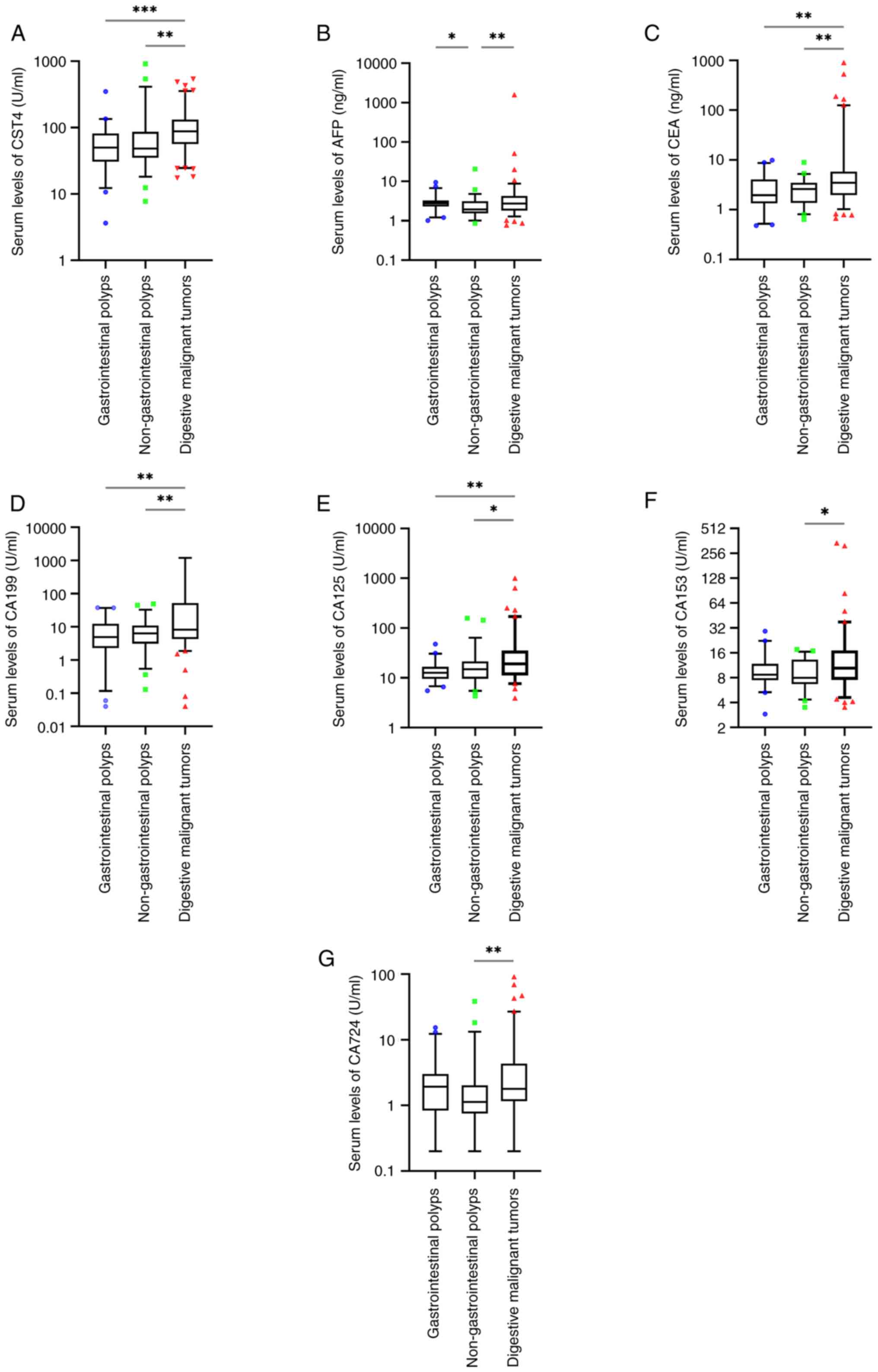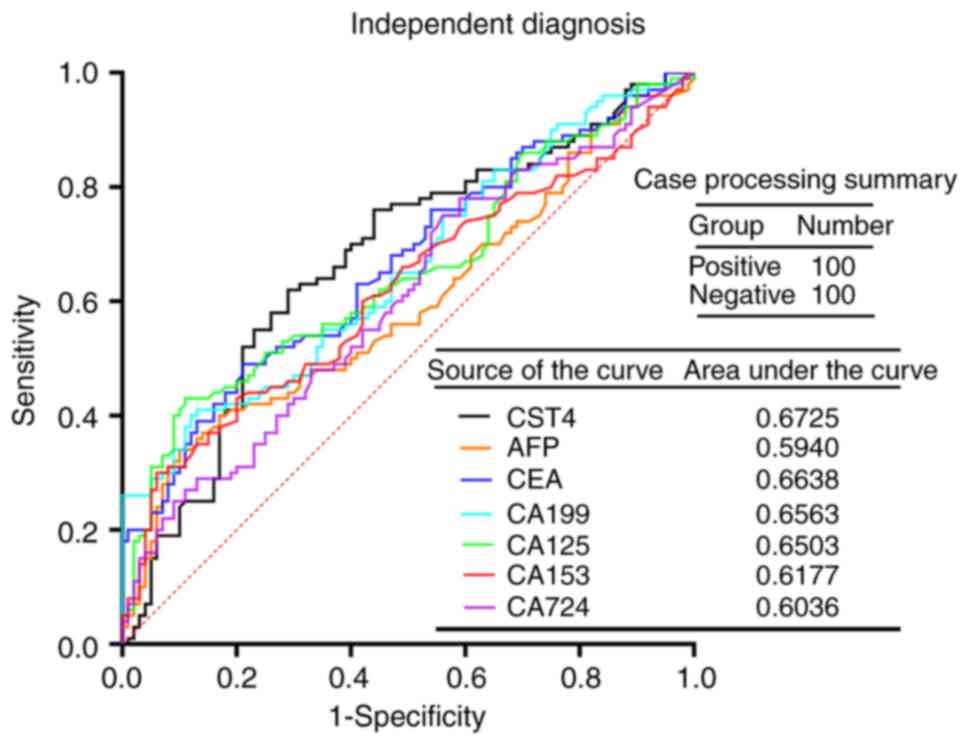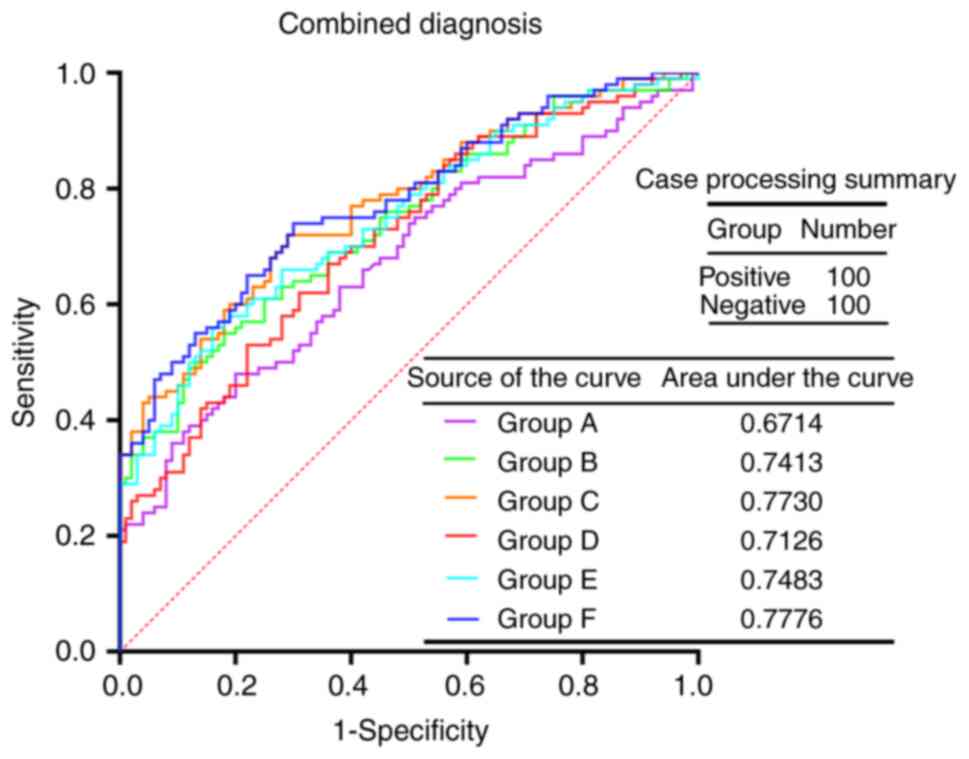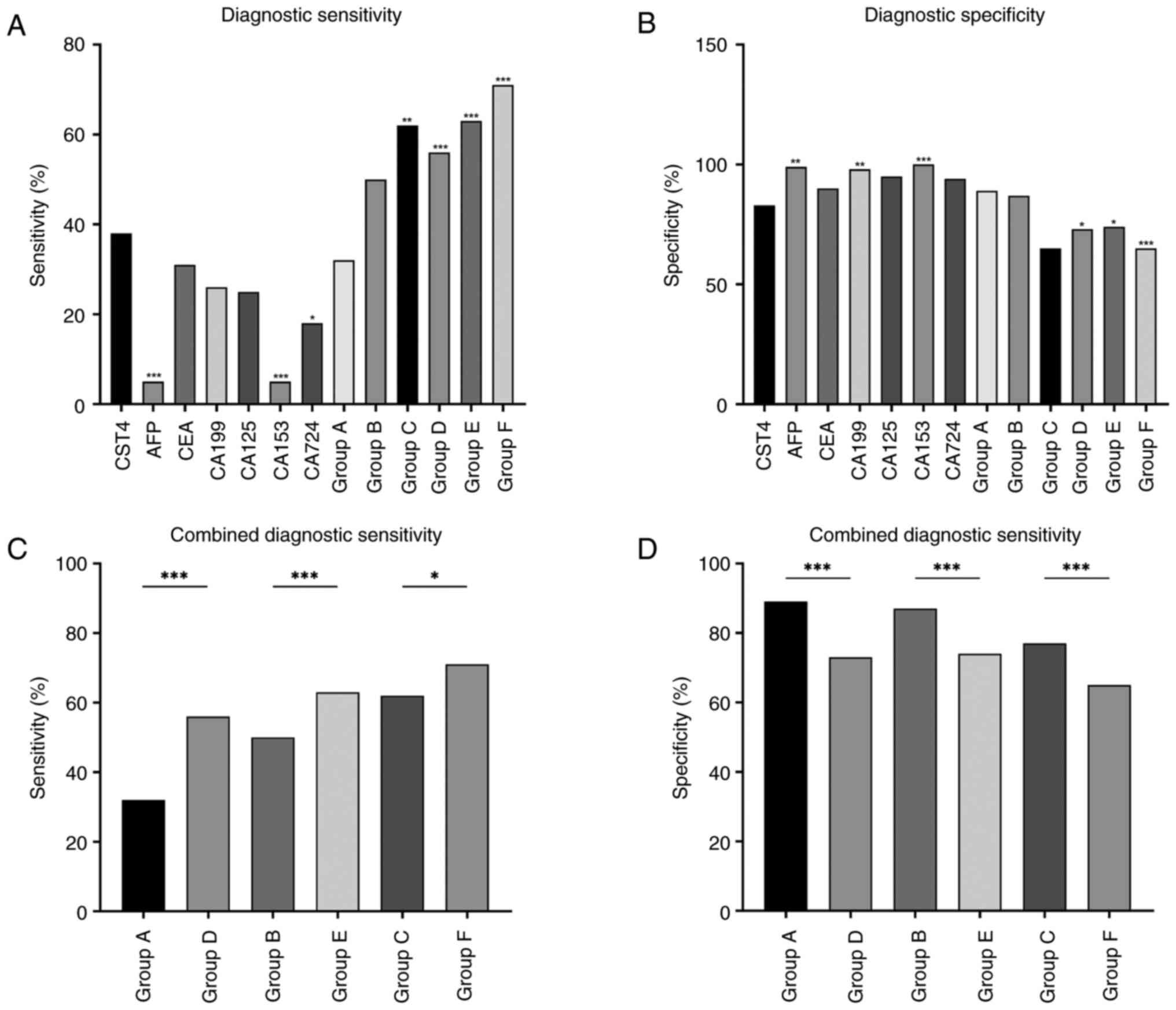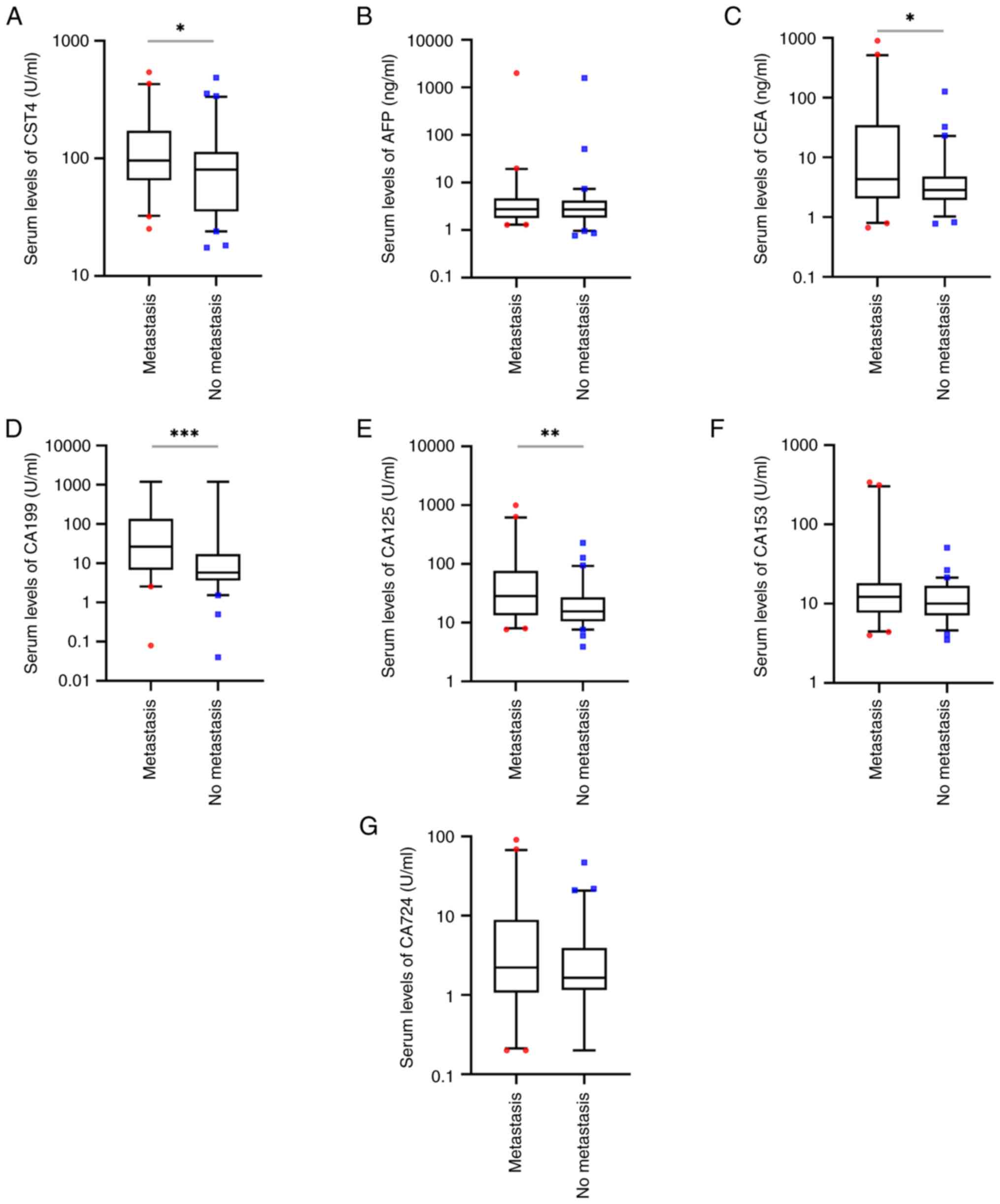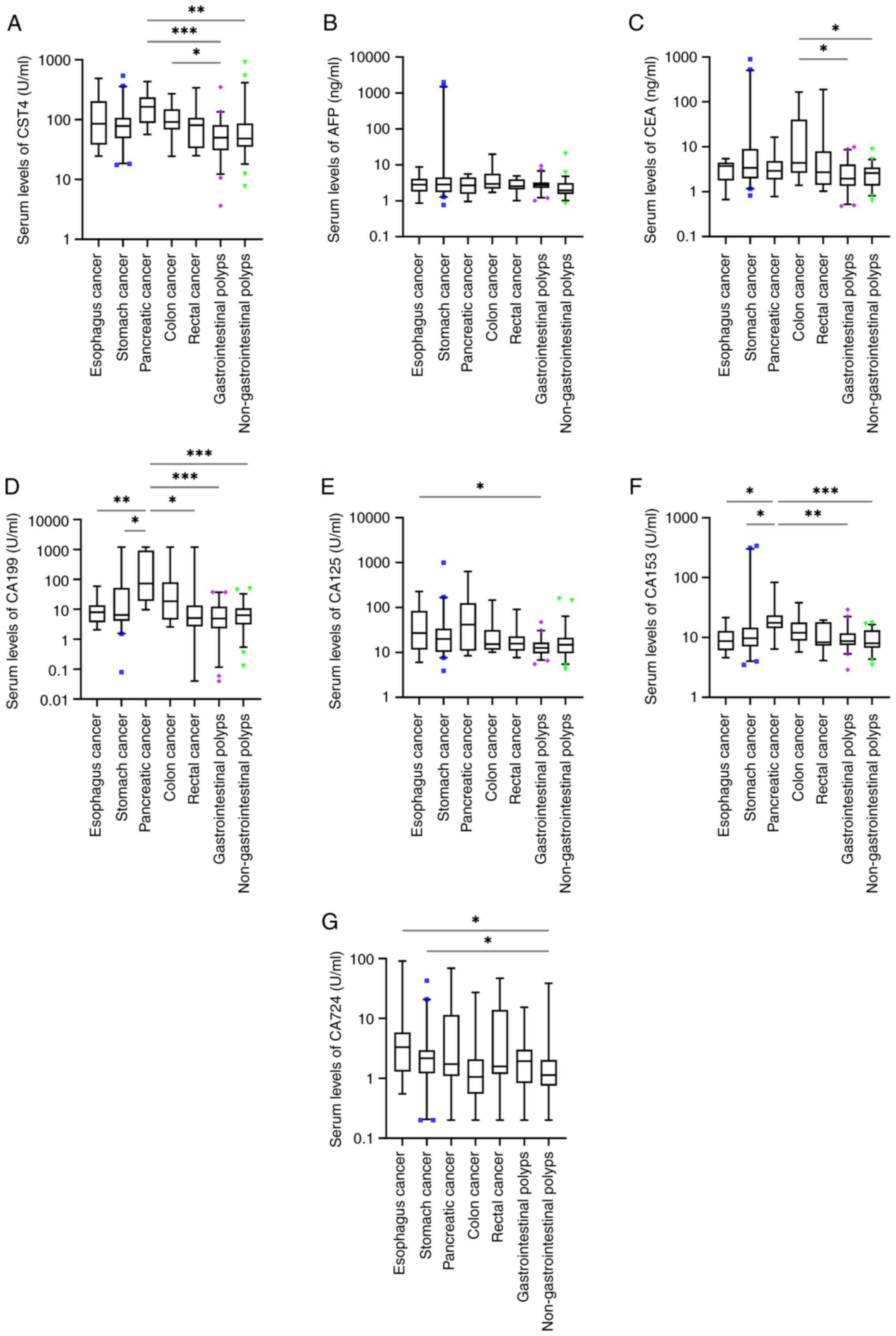|
1
|
WHO Classification of Tumours Editorial
Board. WHO Classification of Tumors, . Digestive System Tumours.
5th edition. International Agency for Research on Cancer; Lyon:
2019
|
|
2
|
Xia C, Dong X, Li H, Cao M, Sun D, He S,
Yang F, Yan X, Zhang S, Li N and Chen W: Cancer statistics in China
and United States, 2022: Profiles, trends, and determinants. Chin
Med J (Engl). 135:584–590. 2022. View Article : Google Scholar : PubMed/NCBI
|
|
3
|
Arnold M, Abnet CC, Neale RE, Vignat J,
Giovannucci EL, McGlynn KA and Bray F: Global burden of 5 major
types of gastrointestinal cancer. Gastroenterology.
159:335–349.e15. 2020. View Article : Google Scholar : PubMed/NCBI
|
|
4
|
Zhang Y, Sun J, Song Y, Gao P, Wang X,
Chen M, Li Y and Wu Z: Roles of fusion genes in digestive system
cancers: Dawn for cancer precision therapy. Crit Rev Oncol Hematol.
171:1036222022. View Article : Google Scholar : PubMed/NCBI
|
|
5
|
Bentley-Hibbert S and Schwartz L: Use of
imaging for GI cancers. J Clin Oncol. 33:1729–1736. 2015.
View Article : Google Scholar : PubMed/NCBI
|
|
6
|
Foley KG, Pearson B, Riddell Z and Taylor
SA: Opportunities in cancer imaging: A review of oesophageal,
gastric and colorectal malignancies. Clin Radiol. 76:748–762. 2021.
View Article : Google Scholar : PubMed/NCBI
|
|
7
|
Torab FC, Bokobza B and Branicki F:
Laparoscopy in gastrointestinal malignancies. Ann NY Acad Sci.
1138:155–161. 2008. View Article : Google Scholar : PubMed/NCBI
|
|
8
|
Nowak KM and Chetty R: Predictive and
prognostic biomarkers in gastrointestinal tract tumours. Pathology.
56:205–213. 2024. View Article : Google Scholar : PubMed/NCBI
|
|
9
|
Turk B, Turk D and Turk V: Protease
signalling: The cutting edge. EMBO J. 31:1630–1643. 2012.
View Article : Google Scholar : PubMed/NCBI
|
|
10
|
Breznik B, Motaln H and Lah Turnšek T:
Proteases and cytokines as mediators of interactions between cancer
and stromal cells in tumours. Biol Chem. 398:709–719. 2017.
View Article : Google Scholar : PubMed/NCBI
|
|
11
|
Hanahan D and Weinberg RA: Hallmarks of
cancer: The next generation. Cell. 144:646–674. 2011. View Article : Google Scholar : PubMed/NCBI
|
|
12
|
Mitrović A, Pečar Fonović U and Kos J:
Cysteine cathepsins B and X promote epithelial-mesenchymal
transition of tumor cells. Eur J Cell Biol. 96:622–631. 2017.
View Article : Google Scholar : PubMed/NCBI
|
|
13
|
Turk B, Turk D and Salvesen GS: Regulating
cysteine protease activity: Essential role of protease inhibitors
as guardians and regulators. Curr Pharm Des. 8:1623–1637. 2002.
View Article : Google Scholar : PubMed/NCBI
|
|
14
|
Liu Y and Yao J: Research progress of
cystatin SN in cancer. Onco Targets Ther. 12:3411–3419. 2019.
View Article : Google Scholar : PubMed/NCBI
|
|
15
|
Dou Y, Lv Y, Zhou X, He L, Liu L, Li P,
Sun Y, Wang M, Gao M and Wang C: Antibody-sandwich ELISA analysis
of a novel blood biomarker of CST4 in gastrointestinal cancers.
Onco Targets Ther. 11:1743–1756. 2018. View Article : Google Scholar : PubMed/NCBI
|
|
16
|
Zhang YQ, Zhang JJ, Song HJ and Li DW:
Overexpression of CST4 promotes gastric cancer aggressiveness by
activating the ELFN2 signaling pathway. Am J Cancer Res.
7:2290–2304. 2017.PubMed/NCBI
|
|
17
|
Wang S, Wang C, Liu O, Hu Y, Li X and Lin
B: Prognostic value of immune-related cells and genes in the tumor
microenvironment of ovarian cancer, especially CST4. Life Sci.
277:1194612021. View Article : Google Scholar : PubMed/NCBI
|
|
18
|
Cai L, Tu M, Yin X, Zhang S, Zhuang W, Xia
Y, Zhang Y, Zhang L, Yu L, Chi L and Huang Y: Combination of serum
CST4 and DR-70 contributes to early diagnosis of colorectal cancer.
Clin Chim Acta. 531:318–324. 2022. View Article : Google Scholar : PubMed/NCBI
|
|
19
|
Yang G, Zhang Y, Lin H, Liu J, Huang S,
Zhong W, Peng C and Du L: CircRNA circ_0023984 promotes the
progression of esophageal squamous cell carcinoma via regulating
miR-134-5p/cystatin-s axis. Bioengineered. 13:10578–10593. 2022.
View Article : Google Scholar : PubMed/NCBI
|
|
20
|
Blanco MA, LeRoy G, Khan Z, Alečković M,
Zee BM, Garcia BA and Kang Y: Global secretome analysis identifies
novel mediators of bone metastasis. Cell Res. 22:1339–1355. 2012.
View Article : Google Scholar : PubMed/NCBI
|
|
21
|
Tian S, Chen Y, Zhang Y and Xu X: Clinical
value of serum AFP and PIVKA-II for diagnosis, treatment and
prognosis of hepatocellular carcinoma. J Clin Lab Anal.
37:e248232023. View Article : Google Scholar : PubMed/NCBI
|
|
22
|
Hori Y, Seo S, Yoh T, Ueno K, Morino K,
Toda R, Nishio T, Koyama Y, Fukumitsu K, Ishii T, et al: Impact of
preoperative CEA uptrend on survival outcomes in patients with
colorectal liver metastasis after hepatectomy. Ann Surg Oncol.
29:6745–6754. 2022. View Article : Google Scholar : PubMed/NCBI
|
|
23
|
Rao H, Wu H, Huang Q, Yu Z and Zhong Z:
Clinical value of serum CEA, CA24-2 and CA19-9 in patients with
colorectal cancer. Clin Lab. April 1–2021.(Epub ahead of print).
doi: 10.7754/Clin.Lab.2020.200828. View Article : Google Scholar
|
|
24
|
Shibata C, Nakano T, Yasumoto A, Mitamura
A, Sawada K, Ogawa H, Miura T, Ise I, Takami K, Yamamoto K and
Katayose Y: Comparison of CEA and CA19-9 as a predictive factor for
recurrence after curative gastrectomy in gastric cancer. BMC Surg.
22:2132022. View Article : Google Scholar : PubMed/NCBI
|
|
25
|
Gao Y, Wang J, Zhou Y, Sheng S, Qian SY
and Huo X: Evaluation of Serum CEA, CA19-9, CA72-4, CA125 and
ferritin as diagnostic markers and factors of clinical parameters
for colorectal cancer. Sci Rep. 8:27322018. View Article : Google Scholar : PubMed/NCBI
|
|
26
|
Li X, Li S, Zhang Z and Huang D:
Association of multiple tumor markers with newly diagnosed gastric
cancer patients: A retrospective study. PeerJ. 10:e134882022.
View Article : Google Scholar : PubMed/NCBI
|
|
27
|
Fahrmann JF, Schmidt CM, Mao X, Irajizad
E, Loftus M, Zhang J, Patel N, Vykoukal J, Dennison JB, Long JP, et
al: Lead-time trajectory of CA19-9 as an anchor marker for
pancreatic cancer early detection. Gastroenterology.
160:1373–1383.e6. 2021. View Article : Google Scholar : PubMed/NCBI
|
|
28
|
Cordero OJ, De Chiara L, Lemos-González Y,
Páez de la Cadena M and Rodríguez-Berrocal FJ: How the measurements
of a few serum markers can be combined to enhance their clinical
values in the management of cancer. Anticancer Res. 28:2333–2341.
2008.PubMed/NCBI
|
|
29
|
Wilhelmsen M, Christensen IJ, Rasmussen L,
Jørgensen LN, Madsen MR, Vilandt J, Hillig T, Klaerke M, Nielsen
KT, Laurberg S, et al: Detection of colorectal neoplasia:
Combination of eight blood-based, cancer-associated protein
biomarkers. Int J Cancer. 140:1436–1446. 2017. View Article : Google Scholar : PubMed/NCBI
|
|
30
|
Sauzay C, Petit A, Bourgeois AM, Barbare
JC, Chauffert B, Galmiche A and Houessinon A: Alpha-foetoprotein
(AFP): A multi-purpose marker in hepatocellular carcinoma. Clin
Chim Acta. 463:39–44. 2016. View Article : Google Scholar : PubMed/NCBI
|
|
31
|
Imamura Y, Yasutake K, Yoshimura Y, Oya M,
Matsushita K, Tokisue M and Sashikata T: Contents of tissue CEA and
CA19-9 in colonic polyp and colorectal cancer, and their clinical
significance. Gastroenterol Jpn. 25:186–192. 1990. View Article : Google Scholar : PubMed/NCBI
|
|
32
|
Tong J, Wang Y, Chang B, Zhang D and Wang
B: Associations between tumor markers and the risk of colorectal
polyp recurrence in Chinese people. Int J Clin Exp Med.
8:6397–6405. 2015.PubMed/NCBI
|
|
33
|
Li X, Xu Y and Zhang L: Serum CA153 as
biomarker for cancer and noncancer diseases. Prog Mol Biol Transl
Sci. 162:265–276. 2019. View Article : Google Scholar : PubMed/NCBI
|
|
34
|
Zhang Y, Zhang M, Bai X, Li C and Zhang L:
Increased serum CA724 levels in patients suffering gout vs cancers.
Prog Mol Biol Transl Sci. 162:177–186. 2019. View Article : Google Scholar : PubMed/NCBI
|
|
35
|
Hao C, Zhang G and Zhang L: Serum CEA
levels in 49 different types of cancer and noncancer diseases. Prog
Mol Biol Transl Sci. 162:213–227. 2019. View Article : Google Scholar : PubMed/NCBI
|
|
36
|
Narimatsu H, Iwasaki H, Nakayama F,
Ikehara Y, Kudo T, Nishihara S, Sugano K, Okura H, Fujita S and
Hirohashi S: Lewis and secretor gene dosages affect CA19-9 and
DU-PAN-2 serum levels in normal individuals and colorectal cancer
patients. Cancer Res. 58:512–518. 1998.PubMed/NCBI
|
|
37
|
Wannhoff A, Werner S, Tao S, Brenner H and
Gotthardt DN: Validation of a genotype-based algorithm that
identifies individuals with low, intermediate, and high serum CA199
levels in cancer-free individuals and in patients with colorectal
cancer. J Gastrointest Oncol. 13:1711–1721. 2022. View Article : Google Scholar : PubMed/NCBI
|
|
38
|
Teng D, Wu K, Sun Y, Zhang M, Wang D, Wu
J, Yin T, Gong W, Ding Y, Xiao W, et al: Significant increased
CA199 levels in acute pancreatitis patients predicts the presence
of pancreatic cancer. Oncotarget. 9:12745–12753. 2018. View Article : Google Scholar : PubMed/NCBI
|
|
39
|
Zeng P, Li H, Chen Y, Pei H and Zhang L:
Serum CA199 levels are significantly increased in patients
suffering from liver, lung, and other diseases. Prog Mol Biol
Transl Sci. 162:253–264. 2019. View Article : Google Scholar : PubMed/NCBI
|
|
40
|
Llàcer P, Núñez J, Manzano L, Cepeda
Rodrigo JM, Salamanca Bautista P, Guzmán García M, Trullás Vila JC,
Quirós López R, López Reboiro ML and Montero-Pérez-Barquero M; en
representación de los investigadores del registro Rica, :
Carbohydrate antigen 125 (CA125) as a prognostic marker in the
elderly with acute heart failure and preserved ejection fraction.
Med Clin (Barc). 159:164–170. 2022.(In English, Spanish).
View Article : Google Scholar : PubMed/NCBI
|
|
41
|
Núñez J, Bayés-Genís A, Revuelta-López E,
Ter Maaten JM, Miñana G, Barallat J, Cserkóová A, Bodi V,
Fernández-Cisnal A, Núñez E, et al: Clinical role of CA125 in
worsening heart failure: A BIOSTAT-CHF study subanalysis. JACC
Heart Fail. 8:386–397. 2020. View Article : Google Scholar : PubMed/NCBI
|
|
42
|
Wang J, Yu L, Sun Y, Zhang L, Tu M, Cai L,
Yin X, Pan X, Wang T and Huang Y: Development and evaluation of
serum CST1 detection for early diagnosis of esophageal squamous
cell carcinoma. Cancer Manag Res. 13:8341–8352. 2021. View Article : Google Scholar : PubMed/NCBI
|
|
43
|
Edoo MIA, Chutturghoon VK, Wusu-Ansah GK,
Zhu H, Zhen TY, Xie HY and Zheng SS: Serum biomarkers AFP, CEA and
CA19-9 combined detection for early diagnosis of hepatocellular
carcinoma. Iran J Public Health. 48:314–322. 2019.PubMed/NCBI
|
|
44
|
Wojtalewicz N, Vierbaum L, Kaufmann A,
Schellenberg I and Holdenrieder S: Longitudinal evaluation of AFP
and CEA external proficiency testing reveals need for method
harmonization. Diagnostics (Basel). 13:20192023. View Article : Google Scholar : PubMed/NCBI
|
|
45
|
Tang Y, Cui Y, Zhang S and Zhang L: The
sensitivity and specificity of serum glycan-based biomarkers for
cancer detection. Prog Mol Biol Transl Sci. 162:121–140. 2019.
View Article : Google Scholar : PubMed/NCBI
|
|
46
|
Chen C, Chen Q, Zhao Q, Liu M and Guo J:
Value of combined detection of serum CEA, CA72-4, CA19-9, CA15-3
and CA12-5 in the diagnosis of gastric cancer. Ann Clin Lab Sci.
47:260–263. 2017.PubMed/NCBI
|
|
47
|
Marcolini EG, Putnam AT and Aydin A:
History and perspectives on nutrition and hydration at the end of
life. Yale J Biol Med. 91:173–176. 2018.PubMed/NCBI
|
|
48
|
Ho JJ, Chung YS, Yuan M, Henslee JG and
Kim YS: Differences in expression of SPan-1 and CA15-3 antigens in
blood and tissues. Int J Cancer. 52:693–700. 1992. View Article : Google Scholar : PubMed/NCBI
|
|
49
|
Liu L, Xu HX, Wang WQ, Wu CT, Xiang JF,
Liu C, Long J, Xu J, Fu de L, Ni QX, et al: Serum CA125 is a novel
predictive marker for pancreatic cancer metastasis and correlates
with the metastasis-associated burden. Oncotarget. 7:5943–5956.
2016. View Article : Google Scholar : PubMed/NCBI
|















